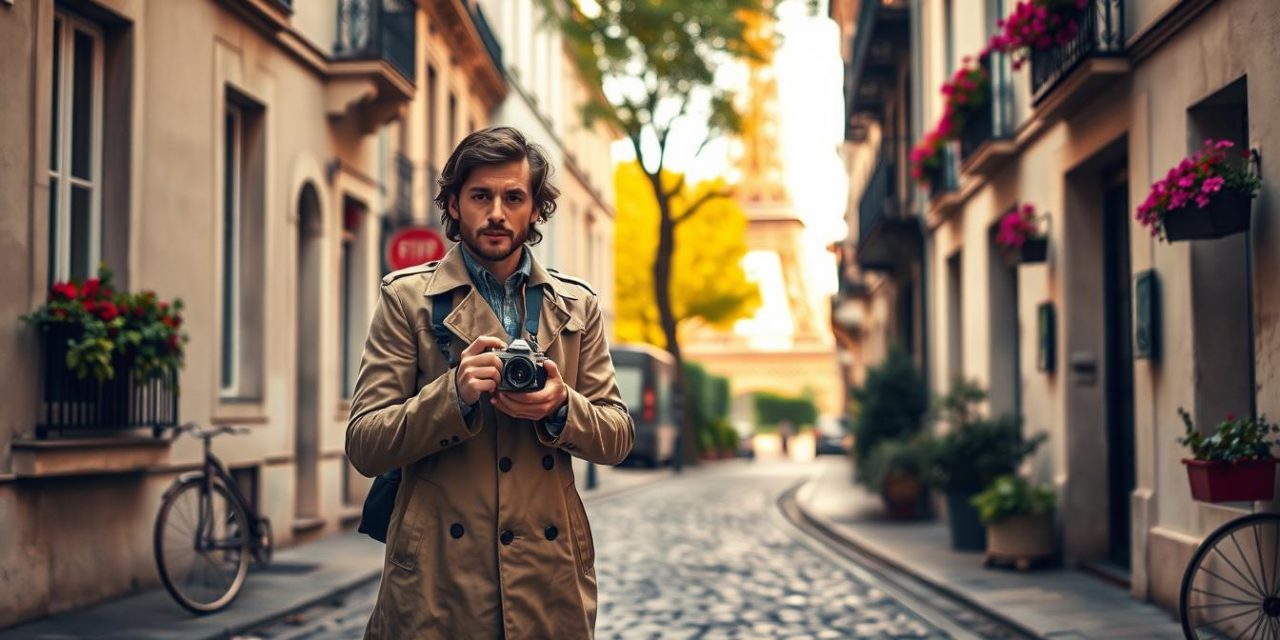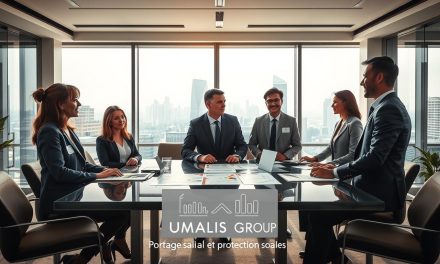Welcome to your complete guide on finding the perfect visual storyteller in France. Hiring a skilled professional can transform your special moments into lasting memories.
Whether you need beautiful wedding photos, professional business images, or creative family portraits, this guide will help you make the right choice. We’ll walk you through every step of the process.
Choosing the right creative partner involves more than just reviewing their portfolio. You’ll want to consider their experience, equipment, and approach to client management.
From understanding pricing to preparing for your session day, we cover everything. This ensures you get exceptional results that match your vision perfectly.
Table of Contents
Key Takeaways
- Freelance professionals offer personalized service and creative flexibility
- Portfolio review is essential to ensure style alignment with your needs
- Clear communication about expectations leads to better final images
- Understanding pricing structures helps budget appropriately for your project
- Proper preparation ensures a smooth and successful photography session
Why Hire a Freelance Photographer in France?
Independent visual artists bring a special touch to every project they handle. They operate their own creative businesses with passion and professionalism.
These professionals manage every aspect of their work personally. From finding clients to delivering final images, they handle it all with care.
You get direct communication and personalized service when working with them. They adapt their approach to match your specific vision and requirements.
Their creative flexibility allows them to handle diverse photography needs. Whether you need corporate event coverage or intimate family portraits, they deliver.
Many independent professionals develop unique artistic styles that make your photos stand out. Their personal touch adds special value to every image they create.
They often maintain competitive rates while using top-quality equipment. Modern cameras and editing software ensure outstanding results for both print and digital use.
These artists build their reputation through word-of-mouth recommendations. This motivates them to consistently deliver exceptional work that exceeds expectations.
In France, they understand local regulations and location requirements. This knowledge helps streamline the process for various types of shoots.
Choosing an independent creative supports local artists and entrepreneurs. You contribute to France’s vibrant artistic community while getting beautiful photographs.
Their business management skills ensure smooth projects from start to finish. You receive professional handling of scheduling, contracts, and image delivery.
Understanding What a Freelance Photographer Does
Many people picture someone just snapping pictures. The reality involves much more behind-the-scenes effort.
These creative professionals wear multiple hats to deliver exceptional results. Their job blends artistic vision with practical business sense.
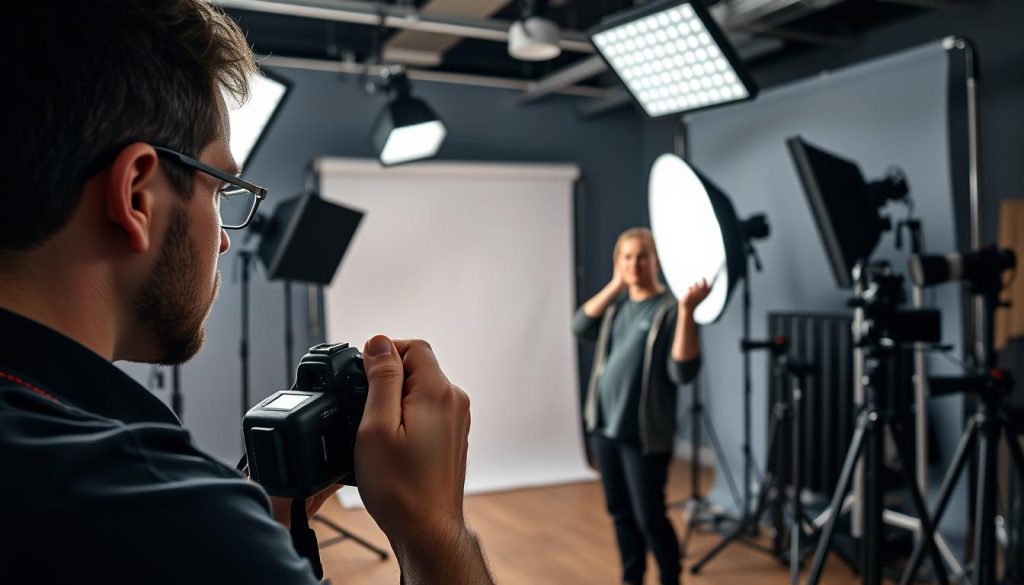
Roles and Responsibilities Beyond Taking Photos
Successful artists handle numerous tasks before ever pressing the shutter button. They begin by deeply understanding your vision through detailed conversations.
Location scouting becomes essential for finding perfect backdrops. They check lighting conditions and secure necessary permits for public spaces.
Equipment preparation ensures everything works perfectly on shoot day. Backup gear and charged batteries prevent unexpected problems.
During sessions, they manage lighting and direct subjects naturally. They create comfortable environments that yield genuine expressions.
After capturing images, extensive post-production work begins. This includes selecting the best shots and enhancing them through editing software.
They deliver final images in your preferred formats and resolutions. Professional file management keeps your photographs organized and accessible.
Key Skills Every Professional Should Have
Strong communication stands as their most valuable tool. They listen carefully to interpret your needs accurately.
Technical expertise with cameras and lighting equipment is fundamental. They understand how different settings affect the final image.
Time management keeps multiple projects on schedule simultaneously. They meet deadlines without compromising quality.
Business acumen helps them manage contracts and pricing fairly. They maintain professional relationships through clear agreements.
Adaptability lets them handle unexpected changes during events. Weather, lighting, or schedule adjustments require quick thinking.
Networking skills help them connect with new clients and collaborators. Word-of-mouth recommendations often drive their business growth.
Creative problem-solving turns challenges into opportunities. They find solutions that enhance rather than limit their art.
Identifying Your Photography Needs
Starting with a clear vision of your photographic goals will guide you toward the perfect creative partner. This initial step helps ensure your final images match exactly what you imagined.
Think about why you want these photos taken. Are they for personal memories, business promotion, or artistic expression? Your purpose determines the type of specialist you’ll need.
Common Types of Photography Services
The photography industry offers a wide range of specialized services. Each type requires different skills and equipment to achieve the best results.
Wedding photography captures one of life’s most important days. Professionals in this field excel at documenting emotional moments and large groups.
Portrait sessions focus on individuals or families. These artists create beautiful images that reflect personality and relationships.
Event coverage includes birthdays, conferences, and parties. The work involves capturing candid moments as they happen naturally.
Product shots showcase items for online stores or advertisements. This requires precise lighting and attention to detail.
Specialized niches include fashion, architecture, and food photography. Each area demands unique expertise and artistic vision.
Matching Your Project with the Right Specialist
Finding the perfect match involves more than just reviewing portfolios. You’ll want someone whose experience aligns with your specific needs.
Consider the photographer’s previous work with similar projects. For example, wedding specialists handle fast-paced environments differently than studio artists.
Discuss your project scope during initial conversations. Be clear about the number of shots needed, locations, and desired mood.
Ensure they have proper equipment for your type of shoot. Indoor sessions may require lighting setups, while outdoor events need portable gear.
Assess their ability to work with different subjects. Family sessions demand patience with children, while corporate events require professional demeanor.
| Photography Type | Best For | Key Equipment Needs | Skill Focus |
|---|---|---|---|
| Wedding | Special events, large groups | Multiple cameras, fast lenses | People management, timing |
| Portrait | Individuals, families | Lighting equipment, backdrops | Posing, connection |
| Product | E-commerce, advertising | Studio lighting, macro lenses | Detail orientation, editing |
| Event | Parties, conferences | Portable gear, flash units | Candid capture, adaptability |
| Real Estate | Property marketing | Wide-angle lenses, tripods | Space presentation, lighting |
By clearly defining your needs from the beginning, you’ll find a professional who delivers exceptional results. The right match makes all the difference in your final images.
Where to Find Freelance Photographers in France
Discovering the right visual artist for your project has never been more accessible. France offers numerous channels to connect with talented professionals who can bring your vision to life.
Both digital platforms and local networks provide excellent opportunities. You can find artists specializing in various photography styles and services.
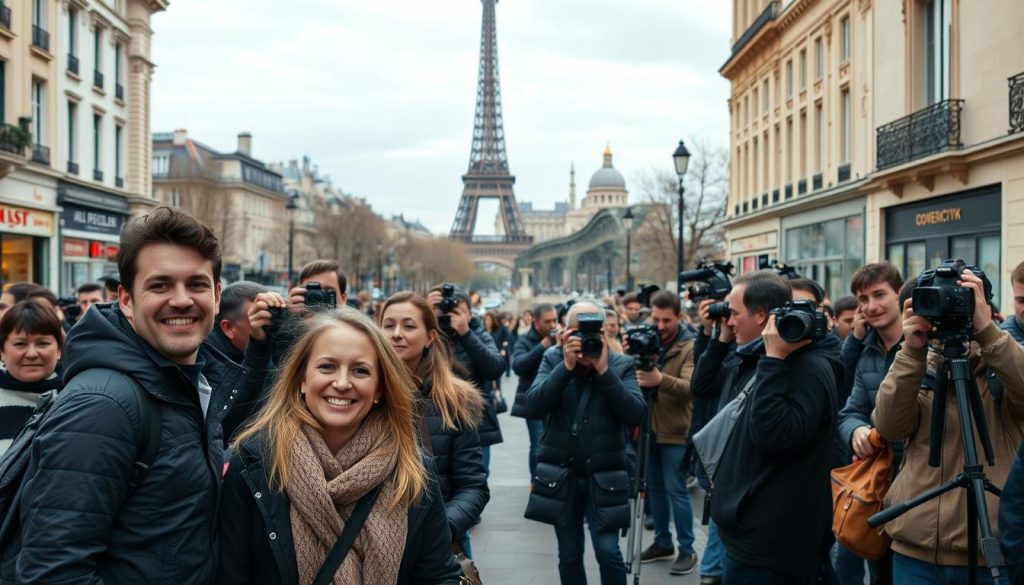
Online Platforms and Directories
The digital landscape offers powerful tools for your search. Specialized websites help you browse portfolios and compare creative approaches.
Many professionals maintain detailed profiles showcasing their best work. You can see examples of weddings, portraits, and commercial projects.
Social media channels serve as dynamic portfolios for visual artists. Platforms like Instagram display recent work and client interactions.
Dedicated marketplaces simplify the hiring process with built-in tools. They offer contract templates and secure payment systems for peace of mind.
Local Networks and Recommendations
Personal connections often lead to the most reliable discoveries. Friends and family can recommend artists they’ve worked with successfully.
Professional associations maintain directories of vetted members. These organizations ensure members maintain industry standards and quality.
Local events provide opportunities to meet artists in person. Art fairs and wedding expos let you discuss projects face-to-face.
Community gatherings showcase regional talent and styles. You can see work that reflects local culture and environments.
| Search Method | Best For | Key Advantages | Considerations |
|---|---|---|---|
| Online Directories | Broad selection, comparison shopping | Filter by specialty, view multiple portfolios | Verify recent work and client reviews |
| Social Media | Seeing current styles and projects | Direct messaging, recent work examples | Check professional credentials separately |
| Personal Recommendations | Trusted referrals | Firsthand experience reports | Style might not match your vision |
| Local Associations | Quality-assured professionals | Vetted members, industry standards | May have higher rates due to credentials |
| Community Events | In-person meetings | Discuss projects directly, see printed work | Limited to event dates and locations |
Combining online research with local networking yields the best results. You find someone with both the technical skills and local knowledge. For more insights on building a strong portfolio, explore our guide on portfolio development strategies.
This approach ensures you connect with professionals who understand France’s unique landscapes and regulations. You’ll find the perfect match for your specific photography needs.
Evaluating a Photographer’s Portfolio and Style
Your visual project deserves the perfect creative match. Reviewing a professional’s portfolio gives you the clearest picture of their capabilities and artistic approach.
Look for diversity in their displayed work. A strong collection shows versatility across different photography types and situations.
Technical excellence forms the foundation of great images. Check lighting consistency and sharp focus across various shooting conditions.
Composition reveals their artistic eye. Notice how they frame subjects and use space creatively in each shot.
Style assessment matters greatly for your project’s success. Some artists specialize in candid moments while others create carefully staged scenes.
Consistency across their portfolio indicates reliability. You want someone who delivers quality results every time.
Look for examples similar to your specific needs. Wedding coverage requires different skills than product photography or family portraits.
Examine how they work with people in their images. Portraits should show genuine emotion and connection between subjects.
Event photography needs dynamic energy and timing. The best moments often happen quickly and require anticipation.
Post-processing skills complete the visual story. Editing software can transform good shots into exceptional final images.
Ask to see complete galleries from past projects. Highlight reels show only the best work while full sets reveal consistent performance.
Client testimonials provide valuable insights about their working style. Happy clients often share details about the overall experience.
Behind-the-scenes information helps understand their process. Some professionals share project stories that demonstrate problem-solving abilities.
Your thorough evaluation ensures the right match for your vision. The perfect creative partnership leads to images you’ll treasure forever.
Questions to Ask Before Hiring
Finding the right creative partner starts with asking the right questions. These conversations help you understand their approach and ensure they match your vision.
Good questions reveal experience, reliability, and working style. You’ll feel confident knowing you’ve chosen the best person for your project.

About Experience and Specialization
Start by discussing their background in your specific type of work. Ask how many similar projects they’ve completed successfully.
Inquire about their specialty areas like weddings or commercial shoots. This ensures they have the right skills for your needs.
Request examples from past clients with similar requirements. Seeing actual work gives you confidence in their abilities.
Regarding Equipment and Techniques
Professional gear makes a big difference in final image quality. Ask about their cameras, lenses, and lighting equipment.
Discuss how they handle challenging situations like low light or bad weather. Their solutions show problem-solving skills.
Learn about their editing software and file delivery methods. This affects how you receive and use your final images.
| Question Category | Key Questions to Ask | What Their Answers Reveal | Why It Matters |
|---|---|---|---|
| Experience Level | Years in business, similar projects completed | Depth of practical knowledge and reliability | Ensures they can handle your specific requirements |
| Specialization | Primary focus areas, favorite types of work | Areas of expertise and passion | Matches their strengths with your project needs |
| Equipment Quality | Camera models, lens selection, lighting gear | Technical capabilities and investment in tools | Affects image quality and ability to handle various conditions |
| Backup Plans | Equipment failure response, weather alternatives | Preparedness and problem-solving approach | Ensures your shoot proceeds smoothly despite challenges |
| Client Collaboration | Communication methods, feedback incorporation | Working style and flexibility | Determines how well they’ll adapt to your vision |
| Delivery Timeline | Editing time, file delivery schedule | Workflow efficiency and time management | Helps you plan for when you’ll receive final images |
Asking these questions helps you find someone who truly understands your vision. You’ll build a partnership that creates beautiful results.
Remember to discuss their approach to client collaboration and feedback. Good communication ensures your ideas become reality.
Always ask about backup plans for equipment or weather issues. Professionals always have contingency strategies ready.
Understanding their editing process and delivery timeline helps manage expectations. You’ll know exactly when to expect your final images.
These conversations build trust and ensure you’re making the right choice. Your perfect creative partner is waiting to be found.
Understanding Pricing and Budgeting for Your Project
Smart budgeting helps you get the best value for your photography investment. Knowing how professionals set their prices makes the process much clearer.
Rates vary significantly based on multiple factors. From beginner artists to seasoned experts, each brings different value to your project.
Factors That Influence Professional Rates
Experience level plays a huge role in pricing decisions. Beginners might charge €300 daily while experts command €1,000 or more.
Specialization affects costs dramatically. Wedding coverage demands higher rates due to event complexity and pressure.
Portrait sessions often cost less. They require less equipment and preparation time overall.
Project complexity increases prices. Multiple locations, special equipment needs, or extensive editing add to the final quote.
Equipment quality impacts rates too. High-end cameras, lenses, and lighting gear represent significant business investments.
Editing time and software costs get factored in. Professional-grade programs require subscriptions and skilled operation.
Time spent beyond actual shooting matters. Client communication, file management, and travel time all contribute to the final rate.
Tips for Negotiating and Ensuring Value
Discuss package options that fit your budget. Maybe fewer hours or basic editing works for your needs.
Clarify exactly what’s included in the quote. How many final images will you receive? What about usage rights?
Compare portfolios when evaluating prices. Higher rates often reflect better skills and more consistent results.
Ask about additional costs upfront. Travel expenses or location permits can add surprises to your bill.
Consider reputation and client reviews. Paying slightly more for a recommended professional usually means better results.
Remember that quality photography represents an investment in lasting memories. The right professional delivers value that exceeds the initial cost.
By understanding these pricing factors, you can budget wisely. You’ll find someone who offers excellent quality within your range.
Finalizing the Agreement and Contract
Putting everything in writing protects everyone involved. A clear contract sets expectations and prevents misunderstandings.
This document outlines your project details and working relationship. It ensures both parties understand their roles and responsibilities.
Good agreements build trust and professional confidence. You’ll feel secure knowing your special day or project is properly covered.
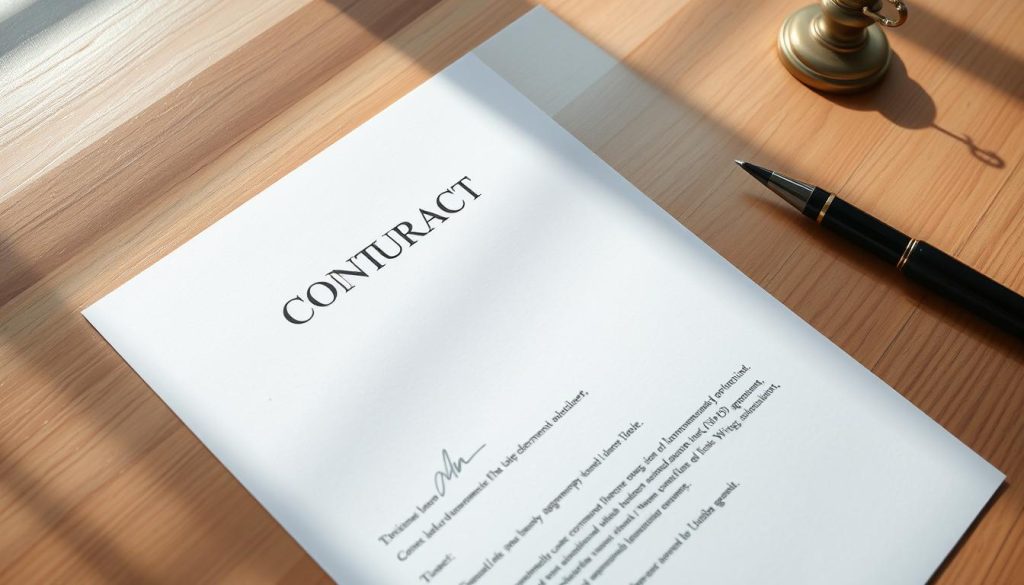
Key Clauses to Include
Your agreement should clearly define the work scope. List the shoot type, locations, and number of expected images.
Include specific deliverables like file formats and delivery methods. This prevents confusion about what you’ll receive.
Set a clear timeline from session date to final delivery. Everyone stays aligned on schedules and deadlines.
Payment terms outline deposit amounts and final balance due dates. Most professionals require booking fees to secure your date.
Cancellation policies protect against last-minute changes. They’re especially important for weddings and major events.
Usage rights define how you can use your photographs. Specify personal, commercial, or exclusive rights.
Liability clauses address equipment failure or weather issues. They outline resolution steps for unexpected problems.
Revision policies state how many edits are included. This lets you request changes without extra costs.
Consider adding governing law and termination clauses. These explain what happens if the project stops early.
Handling Payments and Deliverables
Most professionals use a deposit system for bookings. This secures your date and covers initial planning time.
Final payments typically occur upon image delivery. Some may request balance payment before releasing files.
Discuss accepted payment methods during negotiations. Bank transfers and digital platforms work well for international clients.
Request invoices for proper record keeping. These documents help with budgeting and expense tracking.
Deliverables should match your discussed expectations. Confirm the number of edited images and file formats.
Ask about delivery timelines for your final photographs. Most professionals provide sneak peeks before full galleries.
Revision rounds ensure you get exactly what you want. Typically one or two rounds are included in standard packages.
For more detailed contract guidance, explore our comprehensive resource on freelance agreement best practices.
A well-structured agreement creates a smooth working experience. You’ll enjoy your session knowing everything is properly documented.
Preparing for the Photoshoot in France
Getting ready for your session day ensures everything runs smoothly. Proper planning helps create the perfect conditions for amazing results.
Your preparation makes a huge difference in the final outcome. It allows the creative professional to focus on capturing beautiful moments.
Location Scouting and Permits
Finding the right spot sets the stage for your vision. Consider both the visual appeal and practical aspects of each location.
Lighting conditions change throughout the day. Morning light offers softness while afternoon brings warmer tones.
Accessibility matters for both you and the equipment. Ensure easy entry and enough room to work comfortably.
French regulations require permits for many public spaces. Historical sites and parks often need official approval.
Private properties need owner permission for sessions. Always get written consent to avoid any issues.
Check local event schedules that might affect your chosen spot. Festivals or markets could create unwanted crowds.
Coordinating with the Photographer
Clear communication leads to better collaboration. Discuss every detail to ensure you’re both on the same page.
Timing affects natural light quality dramatically. Golden hour just after sunrise or before sunset creates magical effects.
Weather backups prevent disappointment from rain or harsh sun. Have indoor alternatives ready just in case.
Transportation and parking arrangements keep things stress-free. Know where to meet and how to reach the location.
Outfit choices should complement your surroundings. Neutral colors often work best against varied backgrounds.
Props add personality to your images. Bring items that reflect your style and story.
A shot list helps capture all your important moments. Share your must-have ideas before the session begins.
Equipment needs vary by location and conditions. The artist will prepare appropriate gear for the environment.
Schedule breaks to maintain energy throughout the session. Short pauses keep everyone fresh and engaged.
Thorough preparation creates a relaxed, productive atmosphere. You’ll enjoy the process while getting incredible photographs.
During the Shoot: What to Expect
Your photography session day has finally arrived! This is when all your planning comes together to create beautiful memories. Understanding the process helps you feel comfortable and confident throughout the experience.
Your creative partner will guide you through every step. They combine technical expertise with artistic vision to capture stunning results.
Expect them to direct poses and arrange compositions carefully. They ensure each shot flatters you and matches your vision perfectly.
Technical management happens seamlessly in the background. They adjust lighting and camera settings for optimal results in any environment.
You’ll experience a mix of posed and natural shots. The professional guides interactions to create authentic, emotional moments.
For special events like weddings, they work discreetly. They capture genuine reactions without disrupting the celebration’s flow.
Many artists show previews during the session. This confirms you’re happy with the direction and allows immediate adjustments.
Brief setup times between shots are completely normal. They might change lenses or scout new angles for variety.
Open communication ensures the best collaboration. Share your ideas freely – this helps create images that reflect your true personality.
Outdoor sessions may involve weather changes or bystanders. Trust your creative partner to handle these situations with professionalism.
The atmosphere remains relaxed and enjoyable throughout. Conversation helps keep everyone at ease, creating natural expressions.
Knowing what to expect makes participation easier. You’ll contribute confidently to a productive session with beautiful results.
Your investment in quality photography yields lasting treasures. These images become precious memories you’ll cherish for years.
After the Shoot: Receiving and Using Your Photos
The moment after your photography session ends marks the beginning of an exciting new phase. This is when your captured memories transform into lasting visual treasures you can enjoy and share.
Most professionals deliver edited images within the agreed timeframe. You’ll typically receive them through online galleries or cloud storage links.
Your delivery includes both high-resolution files for printing and web-optimized versions. These formats serve different purposes based on your needs.
You can expect a curated selection of the best shots from your session. Some artists provide all usable images if requested during planning.
Usage rights determine how you can employ your photographs. Personal events might involve creating albums or wall art.
Business projects often use images for marketing materials and website content. Always check your contract for specific usage permissions.
Many professionals offer additional services beyond digital delivery. These can include physical albums, canvas prints, or digital slideshows.
After receiving your images, review them carefully. Most packages include one or two revision rounds for final adjustments.
Consider long-term storage solutions for your valuable images. External drives and cloud services provide reliable backup options.
Effective photo utilization enhances personal memories or professional branding. Plan how to integrate them into your life or business strategy.
| Delivery Method | Best For | Key Advantages | File Types Included |
|---|---|---|---|
| Online Gallery | Easy sharing, client review | Password protection, download options | Web and print resolutions |
| Cloud Storage | Large collections, long-term access | High capacity, organized folders | Full resolution plus sized versions |
| Direct Transfer | Quick delivery, personal touch | Immediate access, no intermediary | Custom formats per request |
| Physical Media | Archival purposes, gifts | Tangible product, highest quality | Printed products plus digital copies |
Understanding this final phase helps maximize your photography investment. You’ll enjoy beautiful results that serve your needs for years.
Your images become part of your personal or professional story. They represent cherished memories and valuable visual assets.
Conclusion
Your journey to find the perfect visual artist in France is now complete. You have all the tools to make a confident choice.
From identifying your needs to reviewing portfolios and negotiating rates, each step matters. Clear communication and proper preparation lead to outstanding results.
Remember that quality images become lasting treasures. They capture special moments and enhance your personal or professional life.
Trust the process and enjoy your collaboration. The right creative partner will deliver beautiful photographs you’ll cherish forever.
We wish you success in creating memorable images that tell your unique story.
FAQ
How do I know if I need a professional for my project?
If you want high-quality images that tell a story or represent your brand well, it’s worth hiring an expert. Whether it’s for personal moments like a family portrait or for business needs such as product shots, a skilled artist brings experience and creativity you might not achieve on your own.
What should I look for in a portfolio?
Look for consistency in style, clarity, and emotion in the images. Check if their previous work aligns with what you envision for your project—whether it’s candid event coverage, polished commercial photos, or creative portraits. A strong portfolio shows versatility and attention to detail.
How are rates typically structured?
A> Pricing can vary based on the shoot duration, image usage rights, and editing time. Many artists charge by the hour, half-day, or full-day, while others offer package deals. Always discuss what’s included, like the number of final images and any additional costs for travel or special equipment.
What questions should I ask before booking?
Inquire about their experience with similar projects, their approach to lighting and composition, and what gear they use. It’s also helpful to ask about their turnaround time for delivering photos and if they provide guidance on locations or outfits.
Do I need to sign a contract?
Yes, a contract protects both you and the artist. It should outline the scope of work, payment schedule, usage rights for the images, and cancellation policies. This ensures everyone is on the same page and helps avoid misunderstandings later.
How can I prepare for the session?
Share your vision and any must-have shots with your artist ahead of time. Discuss locations, timing for the best light, and what to wear. If permits are needed for public spaces, make sure those are arranged in advance to keep everything running smoothly on the day.
What happens after the photos are taken?
After the session, your artist will select the best images, edit them for color and clarity, and deliver them in the agreed format. You’ll typically receive a gallery to review and download. From there, you can use your photos for albums, social media, prints, or marketing materials.

